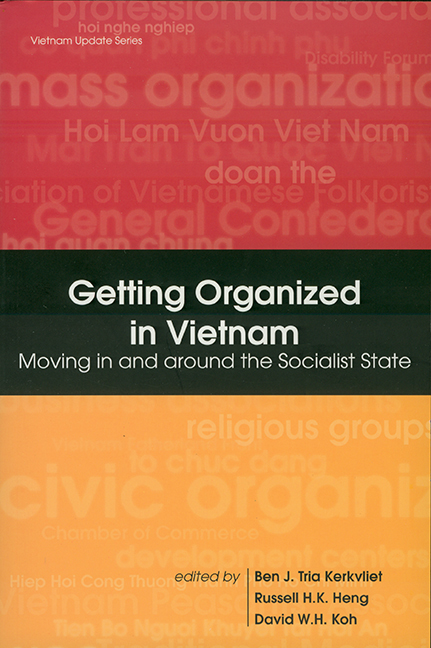Book contents
- Frontmatter
- Contents
- Preface
- Abbreviations
- Introduction: Grappling with Organizations and the State in Contemporary Vietnam
- 1 From Fence-Breaking to Networking: Interests, Popular Organizations, and Policy Influences in Post-Socialist Vietnam
- 2 Business Associations and Policy-Making in Vietnam
- 3 NGOs and Highland Development: A Case Study in Crafting New Roles
- 4 The Disabled and Their Organizations: The Emergence of New Paradigms
- 5 Authoritarian Governance and Labour: The VGCL and the Party-State in Economic Renovation
- 6 The Relationship between Civic and Governmental Organizations in Vietnam: Selected Findings
- 7 Donors, Local Development Groups and Institutional Reform over Vietnam's Development Decade
- Index
- About the Contributors
3 - NGOs and Highland Development: A Case Study in Crafting New Roles
Published online by Cambridge University Press: 21 October 2015
- Frontmatter
- Contents
- Preface
- Abbreviations
- Introduction: Grappling with Organizations and the State in Contemporary Vietnam
- 1 From Fence-Breaking to Networking: Interests, Popular Organizations, and Policy Influences in Post-Socialist Vietnam
- 2 Business Associations and Policy-Making in Vietnam
- 3 NGOs and Highland Development: A Case Study in Crafting New Roles
- 4 The Disabled and Their Organizations: The Emergence of New Paradigms
- 5 Authoritarian Governance and Labour: The VGCL and the Party-State in Economic Renovation
- 6 The Relationship between Civic and Governmental Organizations in Vietnam: Selected Findings
- 7 Donors, Local Development Groups and Institutional Reform over Vietnam's Development Decade
- Index
- About the Contributors
Summary
For many years the role of non-government organizations (NGOs) in sociopolitical development has been described in relation to the importance of a strong civil society in fostering accountability and democratic governance. In Vietnam, until recently, the government through its mass organizations dominated the “landscape” of civil society that in most other nations is dotted with NGOs. This began to change in 1992 when the government issued Decree 35/CP allowing the formation of private, non-profit social organizations (Sidel 1995). In 1996, I interviewed about 15 organizations in Hanoi that were using the term “NGO” to describe their activities (Gray 1999). Most had used Decree 35 to register directly or indirectly under the Vietnam Union of Science and Technology Associations (VUSTA).
One of the organizations was Towards Ethnic Women (TEW), which worked with minority farmers from several highland provinces. TEW had many interesting ideas for working with minorities, including the networking of farmers from different parts of the country. But despite the innovations offered by groups like TEW, it seemed clear that NGOs in Vietnam were emerging in an environment or social space tightly controlled by the state, and their ability to offer meaningful alternatives to the state approach was very limited. I argued that the pace of growth of Vietnamese NGOs would be dictated largely by the amount of donor support, with some danger that foreign donors would expect a great deal of local NGOs, and try to push them to accomplish too much. I felt this way because in large measure the literature on NGOs and civil society talked in terms of an “independence” or even “opposition” to the state, or state structures—as if a clear dividing line could be drawn between state and society. A more accurate starting point with which to view the development of NGOs in Vietnam would be to look at civil society as a sphere or “arena” where competing ideas are debated and acted upon, as described by Ben Kerkvliet in an article on state–society relations in Vietnam (Kerkvliet 2001, pp. 239–42).
- Type
- Chapter
- Information
- Getting Organized in VietnamMoving in and around the Socialist State, pp. 110 - 125Publisher: ISEAS–Yusof Ishak InstitutePrint publication year: 2003



